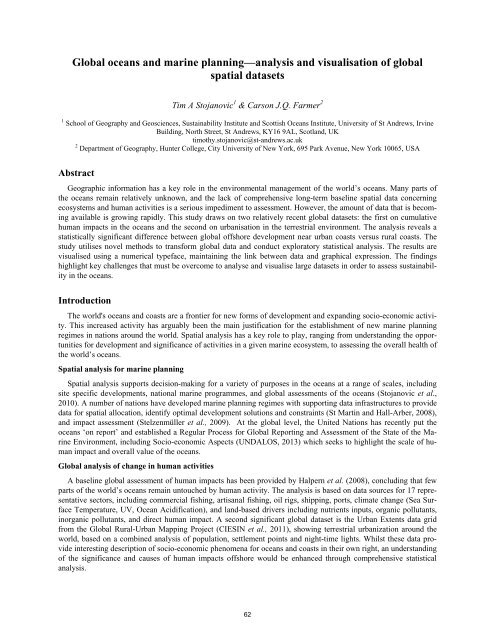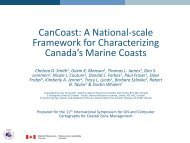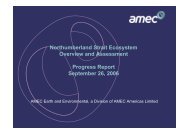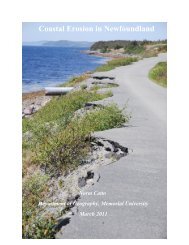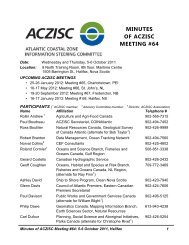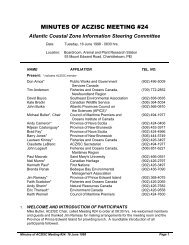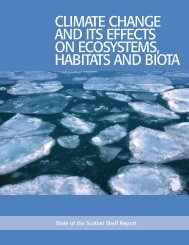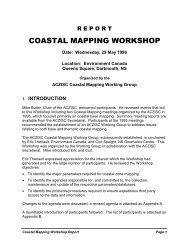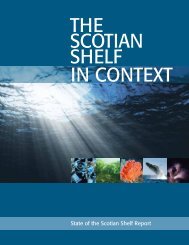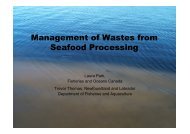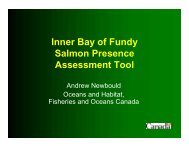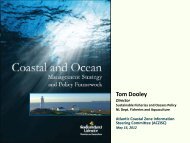Download PDF - COINAtlantic
Download PDF - COINAtlantic
Download PDF - COINAtlantic
- No tags were found...
Create successful ePaper yourself
Turn your PDF publications into a flip-book with our unique Google optimized e-Paper software.
Global oceans and marine planning—analysis and visualisation of globalspatial datasetsTim A Stojanovic 1 & Carson J.Q. Farmer 21 School of Geography and Geosciences, Sustainability Institute and Scottish Oceans Institute, University of St Andrews, IrvineBuilding, North Street, St Andrews, KY16 9AL, Scotland, UKtimothy.stojanovic@st-andrews.ac.uk2 Department of Geography, Hunter College, City University of New York, 695 Park Avenue, New York 10065, USAAbstractGeographic information has a key role in the environmental management of the world’s oceans. Many parts ofthe oceans remain relatively unknown, and the lack of comprehensive long-term baseline spatial data concerningecosystems and human activities is a serious impediment to assessment. However, the amount of data that is becomingavailable is growing rapidly. This study draws on two relatively recent global datasets: the first on cumulativehuman impacts in the oceans and the second on urbanisation in the terrestrial environment. The analysis reveals astatistically significant difference between global offshore development near urban coasts versus rural coasts. Thestudy utilises novel methods to transform global data and conduct exploratory statistical analysis. The results arevisualised using a numerical typeface, maintaining the link between data and graphical expression. The findingshighlight key challenges that must be overcome to analyse and visualise large datasets in order to assess sustainabilityin the oceans.IntroductionThe world's oceans and coasts are a frontier for new forms of development and expanding socio-economic activity.This increased activity has arguably been the main justification for the establishment of new marine planningregimes in nations around the world. Spatial analysis has a key role to play, ranging from understanding the opportunitiesfor development and significance of activities in a given marine ecosystem, to assessing the overall health ofthe world’s oceans.Spatial analysis for marine planningSpatial analysis supports decision-making for a variety of purposes in the oceans at a range of scales, includingsite specific developments, national marine programmes, and global assessments of the oceans (Stojanovic et al.,2010). A number of nations have developed marine planning regimes with supporting data infrastructures to providedata for spatial allocation, identify optimal development solutions and constraints (St Martin and Hall-Arber, 2008),and impact assessment (Stelzenmüller et al., 2009). At the global level, the United Nations has recently put theoceans ‘on report’ and established a Regular Process for Global Reporting and Assessment of the State of the MarineEnvironment, including Socio-economic Aspects (UNDALOS, 2013) which seeks to highlight the scale of humanimpact and overall value of the oceans.Global analysis of change in human activitiesA baseline global assessment of human impacts has been provided by Halpern et al. (2008), concluding that fewparts of the world’s oceans remain untouched by human activity. The analysis is based on data sources for 17 representativesectors, including commercial fishing, artisanal fishing, oil rigs, shipping, ports, climate change (Sea SurfaceTemperature, UV, Ocean Acidification), and land-based drivers including nutrients inputs, organic pollutants,inorganic pollutants, and direct human impact. A second significant global dataset is the Urban Extents data gridfrom the Global Rural-Urban Mapping Project (CIESIN et al., 2011), showing terrestrial urbanization around theworld, based on a combined analysis of population, settlement points and night-time lights. Whilst these data provideinteresting description of socio-economic phenomena for oceans and coasts in their own right, an understandingof the significance and causes of human impacts offshore would be enhanced through comprehensive statisticalanalysis.62


